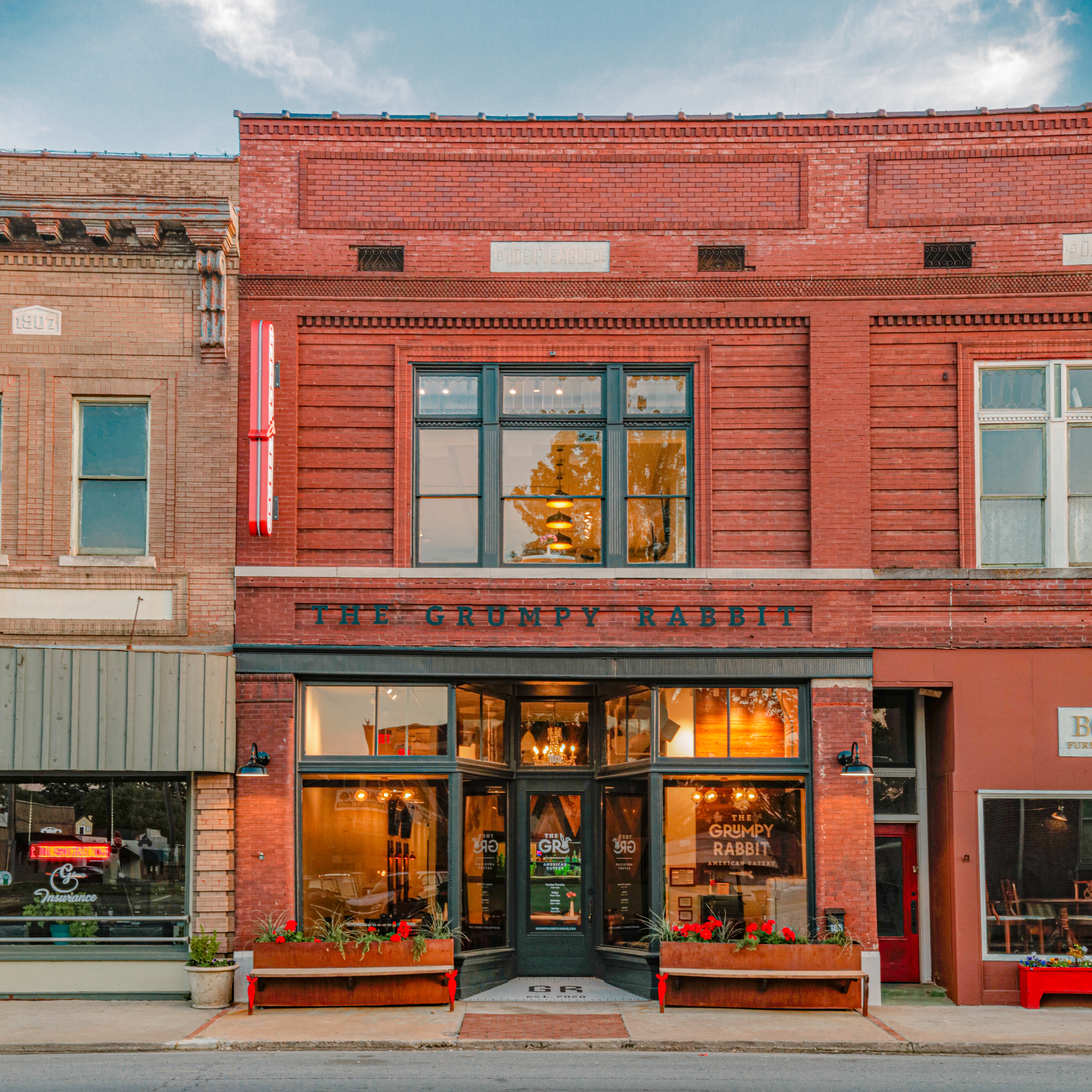Living in the Delta, it’s not unusual to drive an hour or so for dinner on a Friday or Saturday evening. So many overlooked places and storied locales are known for the restaurants and legendary proprietors who keep them full of regular patrons during daily lunch hours and weekend suppers. Whether leaving city limits for a favorite spot frequented for generations, or driving into town to meet friends over a favorite burger or dessert at the place everyone is talking about, we have a way of planning our days, our weekends and our road trips around the places where we love to eat.
Because Arkansas is often lagging in a number of indicators, it tends to be awhile before national restaurant chains, retail and other trends find their way into our borders. When these big names do arrive, they naturally locate near the more obvious population centers and statistically higher income earners. This is sometimes a point of frustration for economic developers, chambers of commerce and commercial real estate professionals who are in an ever-increasing arms race of greater volume with lower margins, and who find themselves competing with neighboring states like Texas and Tennessee for attention, deal-making and job creation. While there is something initially energizing about gaining the attention of a shiny national brand, the pursuit of the latest big thing is often fleeting and less satisfactory in the long term. A compelling case can even be made that these types of generic, interstate-oriented developments do not make our communities unique, memorable or better overall. In many of the smaller communities in the Delta, South Arkansas and other rural parts of our state, the ever-shifting industry metrics, demographics, capacity and infrastructure requirements to attract such national projects may never exist at all. Rather than be discouraged, small communities can be inspired by the example of a number of small towns that have chosen to expend creative energy to develop something unique and homegrown.
LOOKING AT LONOKE
Lonoke has been overlooked for a number of years. It is also a special place, where residents and business owners are working hard to embrace the moniker “The Front Porch of the Delta.” With a deep love for her hometown, Gina Wiertelak created an acclaimed new restaurant in historic downtown Lonoke based on a clear vision and a commitment to excellence. Lonoke has proven to be the perfect setting for such a project, matching a need for quality dining with a built-in local loyalty and a momentum cycle that was ready to support the investment. In 2016, volunteer leaders in Lonoke undertook an extensive strategic planning process with a technical assistance grant from University of Central Arkansas Center for Community and Economic Development and the University of Arkansas Cooperative Extension Service. This process was essentially a community conversation that yielded a game plan and a unifying community vision that was launched in 2017 and which the community has been pursuing diligently for the last five years. The driving concept behind the plan is that Lonoke would become “visible, attractive and connected,” with key points of emphasis in this citizen-driven initiative focused on downtown revitalization, infrastructure and jobs.
Having spent her childhood in Lonoke, Wiertelak spent 31 years of her professional life in Memphis, moving back to her hometown a few years ago with her husband, Jim “Grumpy” Wiertelak.
“It was my dream to come home and try to bring back downtown [Lonoke],” Gina Wiertelak said. In 2019, she was ready to pursue this vision that would serve her community and lean into the progress that the town had been building on in recent years.
“We talked to a lot of people in town about what they thought would help [bring] foot traffic, and all conversations led to a restaurant,” Wiertelak said. With the purchase of the historic Joe P. Eagle Building at 105 Front St. in downtown Lonoke (originally designed by famed architect Charles Thompson), Wiertelak set about building her team that would bring her vision to life.
With a love for the hometown Jackrabbit mascot (Gina was a member of the Lonoke High School women’s basketball team, which won the state championship in 1977) and a tribute to Jim Wiertelak’s grandpa persona “Grumpy,” The Grumpy Rabbit American Eatery concept began to come together. Her team included kitchen-planning consultants, an award-winning interior design team, an architect, landscape architect, branding design and strategy consultant, and historic tax credit consultant. Wiertalk also enlisted the services of Whitney Horton’s team at Arkansas Small Business and Technology Development Center (ASBTDC) at UA Little Rock in the planning and visioning of the restaurant business model.
“It took so much work from so many people,” she said. The result of this intentionally collaborative process is a whole that is greater than the sum of its parts. The Grumpy Rabbit represents the tremendous value-add when a clear vision is paired with a trusted team in a place where people are ready to support it.
“We’ve been very lucky to have the community support us. It almost makes me choke up thinking about it,” Gina Wiertelak said. One of the many things she has learned is that when you build something special for your hometown neighbors, word will get out and people throughout the region will find you and become loyal patrons, too. The restaurant was recently recognized with eight Arkansas Times Readers Choice Awards, including Best New Restaurant, Best Overall Restaurant, Best Chef (James Beard Award finalist James Hale), Best Brunch and Best Burger. Perhaps one of the least-recognized community development principles, but one that is very much on display at The Grumpy Rabbit, is when we build something that is for the community in which we live, it will be attractive to guests and travelers, too. Investing in her hometown is what has driven Gina Wiertelak for many years. Seeing her hometown return the loyalty is tremendously rewarding.
The Grumpy Rabbit is a gift to the community of Lonoke. Easily accessible by bike and located in a walkable downtown, the energy and brightness of the restaurant’s front windows extend all the way to the alley behind, where a surprising balcony dining experience reminiscent of the square at Oxford, Mississippi, is paired with a fun, flexible patio designed by landscape architect Brantley Snipes. These reimagined spaces are one of a kind in the community, and they have been an exciting addition to the fabric of the historic downtown.
STANDING OUT
An important key to success for hospitality projects, and economic development projects of any sort in overlooked places, is the ability to stand out in the crowd. This involves a well-considered awareness of the unique value proposition offered by a local business, the place it is serving, or the region in which it is located. A project must be considered in context, and then built on a premise that is unique and attractive. For Christy Ouei, founder of MuleKick in Magnolia and El Dorado, that unique approach is more about who is in the kitchen, behind the counter and at the tableside, more so than the historic building in which MuleKick MAD is located in the Murphy Arts District, or even the energy of the South Arkansas University students that feeds MuleKick Magnolia. “Investing in team development is what makes us special,” Ouei said. She has developed a keen understanding of the hyperlocal labor factors that impact South Arkansas in the hospitality and service industries, and has intentionally worked to create a culture in which employees and talent at her restaurants see themselves as part of a bigger picture — one in which the food and beverage industries and tourism industries have great potential for positive impact on the community. Weaving a sense of “pride and industry” into the fabric of her establishments is essential to Ouei, and she approaches her team-building efforts with a heaping dose of optimism. Ouei strongly believes in the next generation of students and young talent in her region, and she feels the obligation to ensure that they have an opportunity to learn and lead when they become part of the MuleKick team. From receiving practical training and experience in the industry, to nontraditional personal development training such as financial literacy classes provided by the restaurant, team members at MuleKick are part of something bigger. “We want to add value over their entire lives,” Ouei said. As a result, this deeper level of investment naturally has an impact on patron experience at the MuleKick restaurants. Employees who have an understanding of the establishment’s commitment to celebrating local flavor and supporting local revitalization efforts are able to deliver an exceptional customer service experience. “That’s our guiding ethos — our employee investment and our customer service,” Ouei said.
The Grumpy Rabbit American Eatery has also found a way to stand out in the crowd, shining bright from an unexpected place. In addition to the unique name, The Grumpy Rabbit made an early decision to invest in brand development strategy, hiring Helena, Arkansas-based Thrive, led by Associate Creative Director Sarah Melby and Executive Director Will Staley. Staley often notes that, “Every community should have access to the joy and vibrancy of good design.” Lonoke is one of those places where an emphasis on excellence in design makes a big impact. Thrive’s team was integral in the process of the design environment, working closely with interior designers Natalie Biles (my wife) and Stacey Breezeel of Shine Interior Design Studio to draw elements of the interior palette and finishes into the restaurant’s outward-facing visual elements. The result is a brand launch that had garnered thousands of followers on social media before The Grumpy Rabbit opened in January 2021. By the time the doors opened, the community and the region at large were ready for it, attracted by the friendly, accessible branding that contributed to an irresistible lure.
ADVOCATING FOR THE OVERLOOKED
With such a dynamic approach to their work, proprietors such as Gina Wiertelak and Christy Ouei are positioned to be key ambassadors for their communities. Ouei has embraced this role, describing her commitment to a regionalist mindset. She is sharing her words of experience and encouragement wherever she can, on podcasts “The Heaping Spoonful” produced by Ben E. Keith Food Distributors, The Conductor Podcast with Tiffany Henry, and The CDI Podcast with Dylan Edgell; in publications like City and Town by the Arkansas Municipal League; and at statewide conferences.
“It’s definitely community over competition,” said Ouei, describing her approach, noting that the “Golden Triangle” of South Arkansas communities of Magnolia, Camden and El Dorado offer something special when considered as a collection of unique places. “We can be a destination together,” she said. In her advocacy for a region she loves, she is drawing attention to overlooked places and encouraging locals and visitors to spend time and money at other local establishments, such as Postmasters Grill, developed by Emily Jordan-Robertson, and Native Dog Brewing, developed by Bobby and Lauren Glaze, both in Camden. This love for South Arkansas and care for others are contributing to a greater awareness and changing perception about what our state has to offer in our small communities.
RECOGNIZING THE POTENTIAL WITHIN
Christy Ouei understands that when her employees at MuleKick know how much she values and cares for them, they will become part of a culture where exceptional guest service is a natural outcome. Gina Wiertelak loves to cook for anyone who walks in her front door, but her kitchen at home wasn’t big enough to fit the whole town of Lonoke, so she built a restaurant and hired a world-class chef because she knew her hometown deserved a place to call its own. Both of these women are leading the way in a new approach to development that leans into the cultural and culinary distinctions of their communities, and as a result, are bringing big flavor to our small towns. There is a certain audacity on display when we invest in creating places and celebrating people in overlooked communities.
The pursuit of a unique experience — memorable, enjoyable and shared with others — is part of what makes dining out such an important part of our lives. State tourism promotional dollars are expended on the premise that people will flock to Arkansas when they understand the full offering of authentic experiences to be had here. This effort, paired with an emphasis on asset-based community development, created an environment today where hometown restaurants, both new and old, have been positioned as community anchors and destinations throughout Arkansas. Hospitality projects in rehabilitated historic buildings downtown have great potential to bring energy, identity and fresh flavor to a place, playing a key role in attracting and retaining residents and visitors alike to our hometowns.
Hospitality projects are also often where the most dynamic and powerful design moments happen. There is embodied energy in bringing any type of development to market, and it takes a team of thoughtful and creative people to bring a hospitality project from concept to sustainable reality. There is a case to be made, then, for expending that energy on something unique, place-centric and thoughtfully designed. As MuleKick’s Ouei observed, “National chains don’t add as much depth and dimension to the community.” For Lonoke, the proof is in the numbers. Restaurant tax revenues in Lonoke are up 25% year over year for the first nine months of 2021 compared to the first nine months of 2020. Considering 2020 an anomaly, the increase over the first nine months of 2019 is 18%. Monthly average receipts are up 24% over 2020, and 20% over 2019. The Grumpy Rabbit American Eatery created 55 jobs downtown when it opened — numbers that will pique the interest of any economic developer. If a small town is looking for a spark, it is going to start from within. Architects and designers have the important stewardship of leveraging our creative skills to reawaken latent potential in forgotten places. In a community-centered process of building an ecosystem that supports reinvestment, we have the opportunity to design the conditions in which creativity can make a big impact in our hometowns.
Ryan Biles is a practicing architect, founding the firm Kudzu Collective with a deep love for the people and places of the Delta and a speciality in the adaptive reuse of historic properties in rural communities throughout the region. Ryan and his wife, Natalie, an interior designer and founder of Shine Interior Design Studio, are raising three sons in their hometown of Lonoke.



